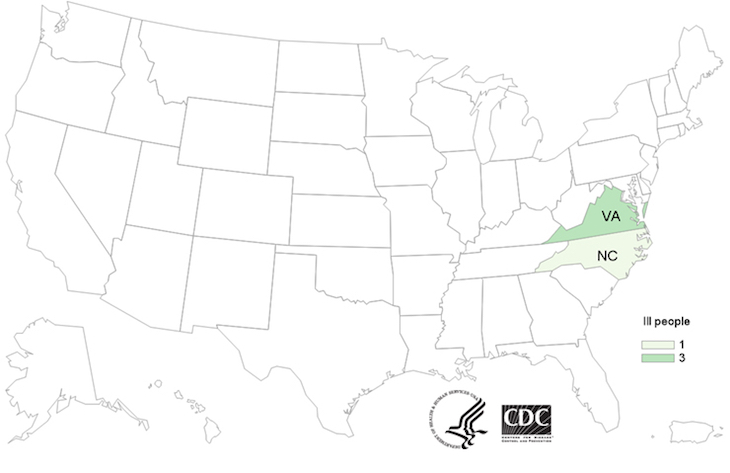The Johnston County Hams Listeria monocytogenes outbreak has ended with four sick, according to a notice posted by the Centers for Disease Control and Prevention (CDC). One person who lived in Virginia died, and the remaining four patients were hospitalized because they were so sick.

Johnston County Hams, located in Smithfield, North Carolina, recalled their ham products on October 3, 2018 because of this outbreak. Several other secondary recalls were issued. The products that were recalled include:
- Johnston County Hams, Inc. Country Style Fully Cooked Boneless Deli Ham
- Ole Fashioned Sugar Cured The Old Dominion Brand Hams Premium Fully Cooked Country Ham with sell-by dates from 4/10/2018 to 9/27/2019
- Padow’s Hams & Deli, Inc. Fully Cooked Country ham Boneless Glazed with Brown Sugar
- Premium Fully Cooked Country Ham Less Salt Distributed by Valley Country Hams, LLC. with sell-by dates from 4/10/2018 to 9/27/2019
- Goodnight Brothers Country Ham Boneless Fully Cooked
All of the recalled products have the establishment number “EST. M2646” inside the USDA mark of inspection. The hams were produced from April 3, 2017 through October 2, 2018.

If you or a loved one has been diagnosed with a Listeria monocytogenes infection, you can contact attorney Fred Pritzker for help by calling 1-888-377-8900.
Investigators used the PulseNet system to find people who may have been part of this outbreak. Whole genome sequencing performed on isolates taken from patients showed that the bacteria that sickened those people were closely related genetically.
The patient age range was from 70 to 81 years. Fifty percent of the patients were female. The Johnston County Ham products were served at an assisted living facility where one ill person who couldn’t be interviewed was a resident.
Epidemiologic, laboratory, and traceback evidence indicates that deli ham products from Johnston County Hams were the likely source of this outbreak. Three of the patients in this outbreak were interviewed; all said they ate deli ham or other deli meat from a grocery store or restaurant before they got sick.
Officials found Listeria monocytogenes in deli ham that was collected from Johnston County Farms facility in 2016 and 2018. Whole genome sequencing performed on the bacteria found that it was closely related genetically to Listeria from ill persons.




